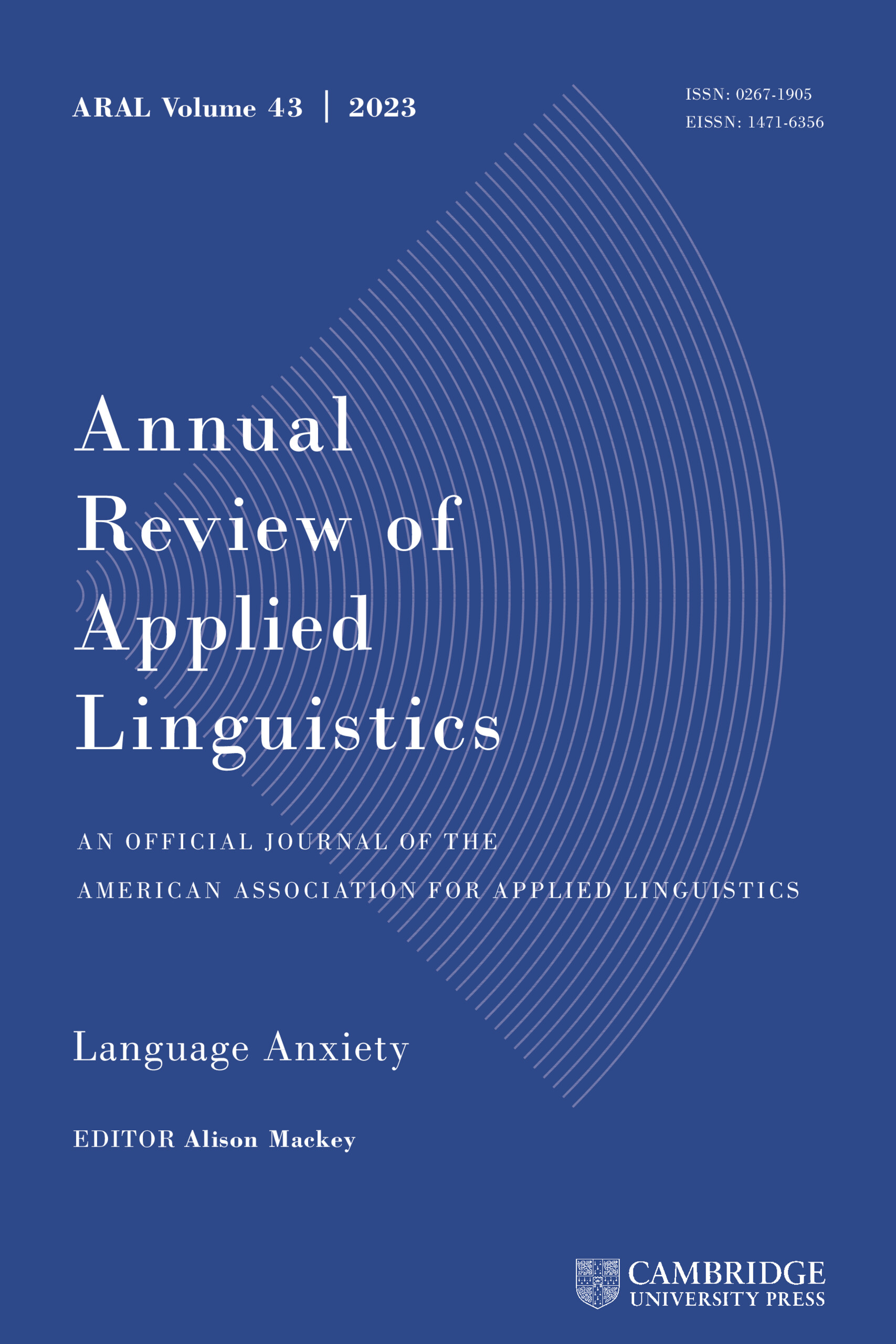Crossref Citations
This article has been cited by the following publications. This list is generated based on data provided by
Crossref.
Plonsky, Luke
and
Oswald, Frederick L.
2011.
Research Methods in Second Language Acquisition.
p.
275.
Plonsky, Luke
and
Gass, Susan
2011.
Quantitative Research Methods, Study Quality, and Outcomes: The Case of Interaction Research.
Language Learning,
Vol. 61,
Issue. 2,
p.
325.
2011.
Larson‐Hall, Jenifer
2011.
Research Methods in Second Language Acquisition.
p.
245.
Plonsky, Luke
2011.
The Effectiveness of Second Language Strategy Instruction: A Meta‐analysis.
Language Learning,
Vol. 61,
Issue. 4,
p.
993.
Norris, John M.
2012.
The Encyclopedia of Applied Linguistics.
Saito, Kazuya
2013.
REEXAMINING EFFECTS OF FORM-FOCUSED INSTRUCTION ON L2 PRONUNCIATION DEVELOPMENT.
Studies in Second Language Acquisition,
Vol. 35,
Issue. 1,
p.
1.
Winke, Paula
2013.
An Investigation Into Second Language Aptitude for Advanced Chinese Language Learning.
The Modern Language Journal,
Vol. 97,
Issue. 1,
p.
109.
Grgurović, Maja
Chapelle, Carol A.
and
Shelley, Mack C.
2013.
A meta-analysis of effectiveness studies on computer technology-supported language learning.
ReCALL,
Vol. 25,
Issue. 2,
p.
165.
Shintani, Natsuko
Li, Shaofeng
and
Ellis, Rod
2013.
Comprehension‐Based Versus Production‐Based Grammar Instruction: A Meta‐Analysis of Comparative Studies.
Language Learning,
Vol. 63,
Issue. 2,
p.
296.
Jackson, Daniel O.
and
Suethanapornkul, Sakol
2013.
The Cognition Hypothesis: A Synthesis and Meta‐Analysis of Research on Second Language Task Complexity.
Language Learning,
Vol. 63,
Issue. 2,
p.
330.
최문홍
and
마지현
2013.
A Comparison of Current Research Topics and Methods Between Domestic and International Journals in SLA.
English Teaching,
Vol. 68,
Issue. 2,
p.
79.
Plonsky, Luke
2013.
STUDY QUALITY IN SLA.
Studies in Second Language Acquisition,
Vol. 35,
Issue. 4,
p.
655.
Handley, Zöe
2014.
Constructing an evidence-base for future CALL design with ‘engineering power’: The need for more basic research and instrumental replication.
The EuroCALL Review,
Vol. 22,
Issue. 2,
p.
46.
Plonsky, Luke
Egbert, Jesse
and
Laflair, Geoffrey T.
2014.
Bootstrapping in Applied Linguistics: Assessing its Potential Using Shared Data.
Applied Linguistics,
p.
amu001.
Pant, Hans Anand
2014.
Aufbereitung von Evidenz für bildungspolitische und pädagogische Entscheidungen: Metaanalysen in der Bildungsforschung.
Zeitschrift für Erziehungswissenschaft,
Vol. 17,
Issue. S4,
p.
79.
Liu, Gi-Zen
Chiu, Wan-Yu
Lin, Chih-Chung
and
Barrett, Neil E.
2014.
English for Scientific Purposes (EScP): Technology, Trends, and Future Challenges for Science Education.
Journal of Science Education and Technology,
Vol. 23,
Issue. 6,
p.
827.
Plonsky, Luke
and
Oswald, Frederick L.
2014.
How Big Is “Big”? Interpreting Effect Sizes in L2 Research.
Language Learning,
Vol. 64,
Issue. 4,
p.
878.
Goh, Christine C.M.
and
Hu, Guangwei
2014.
Exploring the relationship between metacognitive awareness and listening performance with questionnaire data.
Language Awareness,
Vol. 23,
Issue. 3,
p.
255.
Xu, Hainu
and
Lyster, Roy
2014.
Differential effects of explicit form-focused instruction on morphosyntactic development.
Language Awareness,
Vol. 23,
Issue. 1-2,
p.
107.

